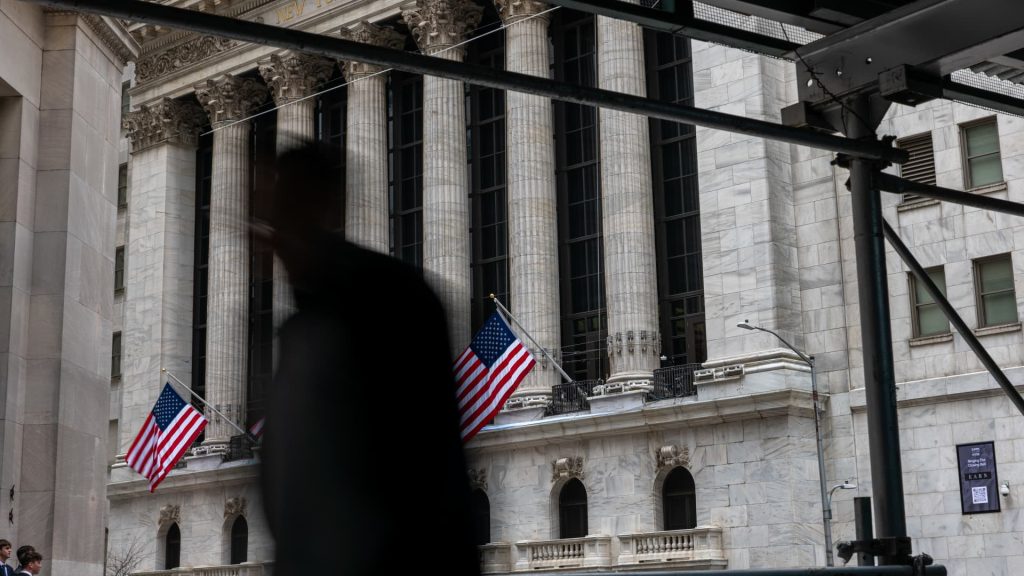People walk by the New York Stock Exchange (NYSE) before the Closing Bell and the start of President Donald Trump’s news conference on tariffs on April 2, 2025 in New York City.
Spencer Platt | Getty Images
U.S. President Donald Trump offered his trading partners — and financial markets — some reprieve on Wednesday as he walked back his tariff policy.
The latest reciprocal tariff rates announced on April 2 were dropped to 10% for 90 days to buy time for negotiations for most of the countries and territories targeted.
Markets breathed a sigh of relief, with a historic rally unfolding on Wall Street on Wednesday and carrying into Asian and European markets on Thursday. But analysts note economic and markets damage might already be done, and it could be difficult to reverse.
“While there has been understandable relief as evidence of a Trump put reemerged following the extreme market conditions that we highlighted yesterday morning, the genie is still out of the bottle on policy unpredictability,” a group of Deutsche Bank Research’s economists and strategists said in a note on Thursday.
The remaining 10% tariff is still the largest hike on such duties in decades and there is little indication on what sort of trade deals the U.S. might accept in negotiations, which means uncertainty is set to continue, they added.
Meanwhile, Preston Caldwell, U.S. economist at Morningstar, suggested markets had reacted too strongly to Trump’s announcement, warning of an economic fallout unless the U.S. president’s tariff policy shifted even further.
“The market is reacting too optimistically today, unless Trump announces further tariff reduction and credibly refrains from future retaliatory increases,” Caldwell said in a note Thursday.
“The average tariff rate as of today still stands at around 20%, with the tariff rate on China at around 125% constituting a de facto embargo,” he explained, saying there would be some tweaks to the economic forecast, but adding that he was still expecting “a major rise in inflation” and economic slowdown.
Stocks, the economy, the dollar
The damage inflicted by uncertainty and the chop-and-change feeling that has been created by frequent policy shifts affect everything from the wider U.S. economy and the country’s position in the world order to stock markets and the dollar, analysts noted.
In a note, Deutsche Bank Research economists and strategists pointed out that, despite the S&P 500 rallying more than 9% during the Wednesday session, “this still left the S&P 500 -3.77% below its level prior to the reciprocal tariff announcements on April 2.”
S&P 500 futures were last down 2.1% at 9:44 a.m. London time.
The U.S. dollar, which saw a sell-off after the reciprocal tariffs were first introduced, also rebounded after Trump’s announcement on Wednesday. It has since eased again. The dollar index was last at 102.41, sharply lower than the highs of around 110 seen in January of this year.
Chris Turner, global head of markets at ING, said in a note that the greenback index was expected to continue “to trade in a volatile 102.00-103.50 range.”
“And it could come lower again over the coming weeks if it looks like the reciprocal tariff shock has done some damage to hard data in the US consumer and business space,” he added.
A wider, macro economic impact has also already unfolded, despite Trump’s move signaling that the U.S. administration is at least somewhat reactive to pressure from businesses and markets, George Saravelos, global head of FX research at Deutsche Bank said in a Wednesday note.
“Even if the tariffs are permanently suspended, damage has been done to the economy via a permanent sense of unpredictability in policy,” he said.
“More structurally, the events of the last few weeks will resonate amongst global economic partners during the upcoming negotiations on trade and indeed for many years to come. The desire to build greater strategic independence from the US across all fronts will be here to stay.”
‘We can heal from this’
Others like Jim Caron, chief investment officer of the portfolio solutions group at Morgan Stanley Investment Management, hold that markets will eventually recover.
“We can heal from this,” he told CNBC’s “Squawk Box Europe” on Thursday. “It’s going to take a little bit of time and some confidence rebuilding.”
Caron said he expected Trump to take a “less heated or more measured approach” to some of his tariff policies over time and to create “wins” through negotiations. Market volatility was previously triggered by the White House not communicating about its plans and what they would mean well enough, he suggested.
“So the damage that’s been done is essentially a shock to confidence that has made people demand a bigger discount to buy certain assets, and that could be bonds, and that can also be equities, and that’s what we’re going through,” Caron stressed. “But over time — we’ve seen shocks in markets before — these things have a way of getting crowded and healing themselves.”


